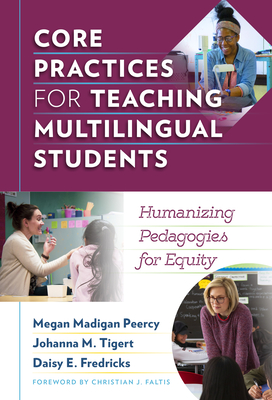
Peercy, Megan Madigan
The authors share real-world examples from the classrooms of ESOL teachers, unpack the teachers' thinking about their instruction, and identify six core practices that are foundational to teaching multilingual students: knowing your multilingual students, building a positive learning environment, integrating content and language instruction, supporting language and literacy development, using assessment, and developing positive relationships and engaging in advocacy.
The book focuses on how K-12 teachers can use these core practices in ways that humanize their instruction--positioning students as whole human beings, valuing the assets and resources they bring to the classroom, actively involving them in rigorous instruction that draws on their experiences and knowledge, responding to each unique learning context, and disrupting traditional power dynamics in education.
Core Practices for Teaching Multilingual Students will help pre- and inservice teachers of multilingual students to center equity and justice in their practice and understand how to move humanizing mindsets into action.
Book Features:
- Identifies and describes core practices for teaching multilingual students.
- Offers opportunities to analyze teachers' instruction using core practices.
- Includes templates and additional resources that help teachers extend the use of core practices to their own planning.
- Supports teacher educators in preparing teachers to move humanizing mindsets to humanizing practices.
- Provides access to supplementary video clips depicting teachers as they engage in these practices and discuss their use.
member goods
listens & views

MIRWOOD SOUL STORY / VARIOUS ...
by MIRWOOD SOUL STORY / VARIOUS (UK)
COMPACT DISCout of stock
$12.99






